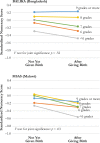The Effects of Adolescent Childbearing on Literacy and Numeracy in Bangladesh, Malawi, and Zambia
- PMID: 31502232
- PMCID: PMC6797635
- DOI: 10.1007/s13524-019-00816-z
The Effects of Adolescent Childbearing on Literacy and Numeracy in Bangladesh, Malawi, and Zambia
Abstract
Global investments in girls' education have been motivated, in part, by an expectation that more-educated women will have smaller and healthier families. However, in many low- and middle-income countries, the timing of school dropout and first birth coincide, resulting in a rapid transition from the role of student to the role of mother for adolescent girls. Despite growing interest in the effects of pregnancy on levels of school dropout, researchers have largely overlooked the potential effect of adolescent childbearing on literacy and numeracy. We hypothesize that becoming a mother soon after leaving school may cause the deterioration of skills gained in school. Using longitudinal data from Bangladesh, Malawi, and Zambia, we test our hypothesis by estimating fixed-effects linear regression models to address the endogeneity in the relationship between childbearing and academic skills. To our knowledge, this is the first study to examine the effects of adolescent childbearing on academic skills in low- and middle-income countries. Our results indicate that among those with low levels of grade attainment, first birth has a negative effect on English literacy and numeracy. Among those with higher levels of grade attainment, we find little evidence of effects of childbearing on academic skills. Childbearing also has little effect on local language literacy. Beyond the immediate loss of English literacy and numeracy, if these skills lead to better health and more economic productivity, then adolescent childbearing may have longer-term repercussions than previously understood. In addition to ongoing efforts to increase educational attainment and school quality in low- and middle-income countries, investments are needed to strengthen the academic skills of adolescent mothers to secure the demographic and economic promise of expanded education for girls and women.
Keywords: Adolescent childbearing; Education; Literacy; Longitudinal data; Numeracy.
Figures




Similar articles
-
Effectiveness of a girls' empowerment programme on early childbearing, marriage and school dropout among adolescent girls in rural Zambia: study protocol for a cluster randomized trial.Trials. 2016 Dec 9;17(1):588. doi: 10.1186/s13063-016-1682-9. Trials. 2016. PMID: 27938375 Free PMC article. Clinical Trial.
-
Early Childbearing, School Attainment, and Cognitive Skills: Evidence From Madagascar.Demography. 2018 Apr;55(2):643-668. doi: 10.1007/s13524-018-0664-9. Demography. 2018. PMID: 29564717
-
"Our girls need to see a path to the future" --perspectives on sexual and reproductive health information among adolescent girls, guardians, and initiation counselors in Mulanje district, Malawi.Reprod Health. 2019 Jan 25;16(1):8. doi: 10.1186/s12978-018-0661-x. Reprod Health. 2019. PMID: 30683127 Free PMC article.
-
Adolescent childbearing in developing countries: a global review.Stud Fam Plann. 1998 Jun;29(2):117-36. Stud Fam Plann. 1998. PMID: 9664627 Review.
-
[What support of young presenting a first psychotic episode, when schooling is being challenged?].Encephale. 2017 Dec;43(6):570-576. doi: 10.1016/j.encep.2017.10.001. Epub 2017 Nov 8. Encephale. 2017. PMID: 29128195 Review. French.
Cited by
-
"I was tricked": understanding reasons for unintended pregnancy among sexually active adolescent girls.Reprod Health. 2021 Jan 22;18(1):19. doi: 10.1186/s12978-021-01078-y. Reprod Health. 2021. PMID: 33482843 Free PMC article.
-
Which Structural Interventions for Adolescent Contraceptive Use Have Been Evaluated in Low- and Middle-Income Countries?Int J Environ Res Public Health. 2022 Sep 16;19(18):11715. doi: 10.3390/ijerph191811715. Int J Environ Res Public Health. 2022. PMID: 36141987 Free PMC article. Review.
-
Contraceptive decision-making and its association with contraceptive use among married adolescent girls in Niger.Reprod Health. 2025 Feb 21;22(1):28. doi: 10.1186/s12978-025-01962-x. Reprod Health. 2025. PMID: 39985103 Free PMC article.
-
Effects of mobile health education on sexual and reproductive health information among female school-going adolescents of rural Thailand.F1000Res. 2021 Jun 8;10:452. doi: 10.12688/f1000research.53007.1. eCollection 2021. F1000Res. 2021. PMID: 34316361 Free PMC article.
-
Transition to motherhood for Japanese primiparas from delivery to 6 months postpartum: A qualitative study.Nurs Open. 2022 Jan;9(1):490-499. doi: 10.1002/nop2.1087. Epub 2021 Oct 4. Nurs Open. 2022. PMID: 34608771 Free PMC article.
References
-
- Abadzi, H. (2003). Adult literacy: A review of implementation experience (World Bank OED Working Paper No. 29387). Washington, DC: Operations Evaluation Department, World Bank.
-
- Allison PD. Fixed effects regression models. Thousand Oaks, CA: SAGE; 2009.
-
- Amin S, Ainul S, Akter F, Alam MM, Hossain MI, Ahmed J, Rob U. From evidence to action: Results from the 2013 baseline survey for the BALIKA project (Report) New York, NY: Population Council; 2014.
-
- Ashcraft A, Lang K. The consequences of teenage childbearing (NBER Working Paper No. 12485) Cambridge, MA: National Bureau of Economic Research; 2006.
Publication types
MeSH terms
Grants and funding
LinkOut - more resources
Full Text Sources
Medical

